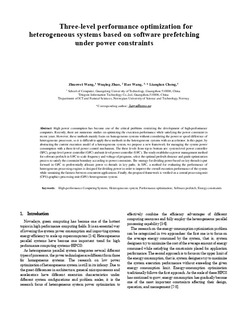Three-level performance optimization for heterogeneous systems based on software prefetching under power constraints
Journal article, Peer reviewed
Submitted version

Åpne
Permanent lenke
http://hdl.handle.net/11250/2592916Utgivelsesdato
2018Metadata
Vis full innførselSamlinger
- Institutt for IKT og realfag [597]
- Publikasjoner fra CRIStin - NTNU [38127]
Sammendrag
High power consumption has become one of the critical problems restricting the development of high-performance computers. Recently, there are numerous studies on optimizing the execution performance while satisfying the power constraint in recent years. However, these methods mainly focus on homogeneous systems without considering the power or speed difference of heterogeneous processors, so it is difficult to apply these methods in the heterogeneous systems with an accelerator. In this paper, by abstracting the current execution model of a heterogeneous system, we propose a new framework for managing the system power consumption with a three-level power control mechanism. The three levels from top to bottom are: system-level power controller (SPC), group-level power controller (GPC) and unit-level power controller (UPC). The study establishes a power management method for software prefetch in UPC to scale frequency and voltage of programs, select the optimal prefetch distance and guide optimization process to satisfy the constraint boundary according to power constraints. The strategy for dividing power based on key threads is put forward in GPC to preferentially allocate power to threads in key paths. In SPC, a method for evaluating the performance of heterogeneous processing engines is designed for dividing power in order to improve the overall execution performance of the system while sustaining the fairness between concurrent applications. Finally, the proposed framework is verified on a central processing unit (CPU)-graphics processing unit (GPU) heterogeneous system.